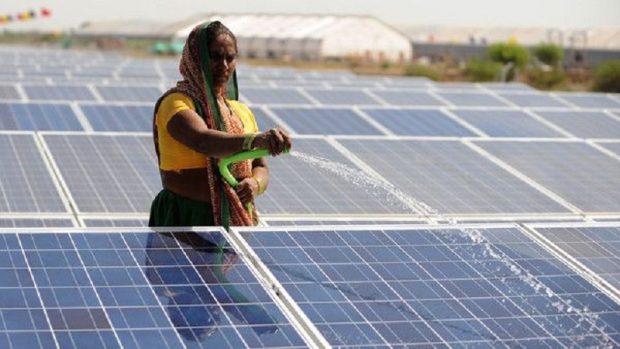
India’s solar, wind energy potential likely to dip due to climate change: Study
PTI, Aug 20, 2022, 6:12 PM IST

Representative Image (Source: Pinterest)
New Delhi: Solar and wind potential in India are likely to face a negative trend in the future due to climate change, according to a new study by the Pune-based Indian Institute of Tropical Meteorology.
The researchers used state-of-the-art climate models devised by the Intergovernmental Panel on Climate Change (IPCC) to analyse the wind and solar projections for the renewable energy sector over the Indian subcontinent.
The seasonal and annual wind speed is likely to decrease over North India and increase along South India. The southern coast of Odisha and the southern Indian states of Andhra Pradesh and Tamil Nadu show promising potential for wind energy in the climate change scenario, said the study titled ‘Analysis of future wind and solar potential over India using climate models’.
The study was published in the peer-reviewed journal Current Science recently.
Regional analysis of wind potential indicates that the frequency of high energy producing wind speeds will decrease, whereas low energy producing wind speeds are likely to increase in the future.
“Solar projections for the future indicate that solar radiation will decrease during all seasons over most of the Indian landmass. For future investments in the solar power sector, central and south-central India must be considered during pre-monsoon months, as the potential loss is minimal in these regions,” it said.
“The present study shows that the renewable energy fields of solar and wind potential in India are likely to face a negative trend in the future… Expanded and more efficient networks of wind and solar farms are needed to increase renewable energy production,” the report read.
Parthasarathi Mukhopadhyay, one of the researchers who conducted the study, said, Our industry must adapt to the changing climate, and our technologies must keep pace. Such predictions should not be taken as facts, but as possibilities.
The efficiency of renewable energy may be impacted by climate change in the Indo-Gangetic plains. The study emphasises the importance of being prepared for scenarios of this kind and addressing it, he said.
The forecasts are important since India has updated its Nationally Determined Contributions (NDCs) to fight climate change, incorporating two of the promises made by Prime Minister Narendra Modi at the Glasgow conference — reducing emissions intensity of GDP by 45 per cent by 2030, from 2005 level, and achieving about 50 per cent cumulative electric power installed capacity from non-fossil fuel-based energy resources by 2030.
Udayavani is now on Telegram. Click here to join our channel and stay updated with the latest news.
Top News

Related Articles More

New Year’s greetings with an artificial but intelligent twist

Space docking experiment: Spacecraft injected into right orbit, ISRO eyes another tech feat

GSLV mission planned in January would be 100th launch from Sriharikota: ISRO chief

From Karnataka to Orbit: Adichunchanagiri SJCIT, RVCE, & Bellatrix Launch Payloads on ISRO’s SpaDEx

ISRO to demonstrate docking of satellites in space in January, launch on Monday
MUST WATCH
Latest Additions

President Droupadi Murmu hails NIMHANS for its integrated medicine services

India always stood by Maldives: EAM Jaishankar

Periya twin murder: CBI Court sentences 10 to double life imprisonment

Woman jumps out of moving autorickshaw to save herself from drunk driver

New day, same story: ‘King’ Kohli fails again; India collapse to 185
Thanks for visiting Udayavani
You seem to have an Ad Blocker on.
To continue reading, please turn it off or whitelist Udayavani.




















